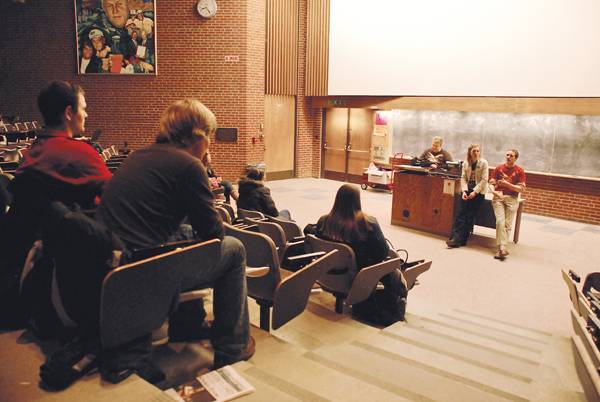On the road to recovery

Michelle Roling, program coordinator, Erin Pederson, staff psychologist and Brad Freinoefer, program coordinator answer questions, Tuesday during the Do I look fat? documentary in the Kildee Auditorium. The documentary was about about gay men, body image and eating disorders. Photo: Yue /Iowa State Daily
February 24, 2010
A “small but mighty crowd” came together Tuesday night to screen the film “Do I Look Fat?” — a documentary on gay men, body image and eating disorders by Travis Mathews.
The film was split into nine sections, ranging from “self esteem disorder,” and “bullying,” to “gender trouble,” “internalized homophobia” and “doing something about it.”
It began with images of men vigorously working out, trying to sculpt perfect bodies.
“I ran from having to think about how I looked,” said Stu, one of the men highlighted throughout the film. “The whole point had become to not look at myself. People perceived me as this fat monster. I didn’t want to hear what I thought they were thinking.”
It went on to examine the traumatic situations and bullying in young boys’ childhoods that could spur eating disorders.
“The commonality of the eating disorder itself and how it attacks the mind and puts people in this shameful, guilty place,” said Michelle Roling, eating disorder treatment co-coordinator for Student Counseling Service. “It’s this consistent, powerful piece that controls people. Regardless of who you are or what you’re struggling with, the eating disorder comes in and shines like it’s the answer to whatever you’re dealing with at the moment.”
Eight gay men’s lives were highlighted throughout the film, each explaining their personal connections to eating disorders and their effects in the gay community.
Young boys who were called names, such as “sissy boy,” try to reclaim their masculinity since they lost it so early on, said David, one of the eight men, who spoke of an equation that many gay men subconsciously think about.
“‘Fat equals weak equals female.’ Therefore people think, ‘Gay equals weak equals female.’ So gay men will do anything to be ‘gay equals strong equals man.’”
The topic that shocked the audience Tuesday night was AIDS. David spoke of a subculture of people who actually want to get infected with HIV.
“They see wasting away as not such a bad thing,” David said. “The thought is, ‘I can never be too thin or ‘If I get that fat, shoot me.’ People would rather die than be fat. AIDS is one thing where you can lose the weight.”
Stu talked about his experience before and after being diagnosed with AIDS.
“I got a lot of attention I wasn’t used to getting [before being diagnosed with AIDS],” Stu said. “I was resentful that somebody liked me because I was fat, had a hairy chest and I had a lot of things opposite of what I believed I should have … I lost 70 pounds after being diagnosed with AIDS. It was a free ride to lose the weight and I was ecstatic about that.”
Erin Pederson, eating disorder treatment co-coordinator for Student Counseling Service, reflected on this subculture after the film.
“I was struck by the subculture of people trying to get HIV,” she said.
Chris Celania, freshman in materials engineering, said, “I had not heard anything about the desire for HIV before this.”
David talked about his decision to get help at the end of the film.
“To talk about it is very important, to someone who’s objective,” he said. “Some people just wouldn’t understand. At the same, time I told other people and they told me, ‘I suffered the same thing; I was bulimic for a time.’”
More information about the film can be found at doilookfatthemovie.com/.






